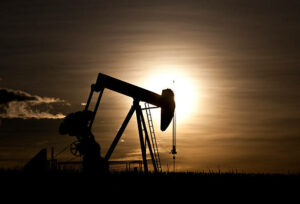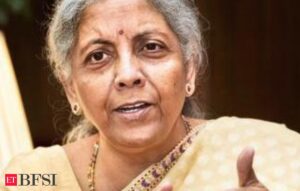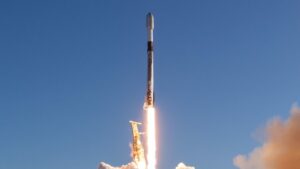Putin says 95% of Russia’s nuclear forces have now been modernized
In this pool photograph distributed by Russian state agency Sputnik, the Tupolev Tu-160M “Ilya Muromets” strategic bomber is seen on the grounds of an aircraft manufacturer in Kazan on February 22, 2024.
Dmitry Azarov | Afp | Getty Images
Russian President Vladimir Putin said on Friday that almost all of the country’s strategic nuclear forces had been modernized and the Russian Air Force had recently taken delivery of four nuclear-capable bombers, according to state news agency Tass.
Putin delivered his comments in a video address to mark Defender of the Fatherland Day in Russia, a holiday that commemorates the country’s veterans. A day earlier, the Russian president flew on a modernized strategic missile carrier known as a TU-160M.
“Today, the share of modern weapons and equipment in the strategic nuclear forces has already reached 95%, while the naval component of the ‘nuclear triad’ is at almost 100%. We have begun serial production of new Zircon hypersonic missiles. Trials of other offensive systems are nearing completion,” Putin said in his address, Tass reported.
“Just the other day in Kazan, four Tu-160M missile carriers were transferred to the Armed Forces,” he added.
A key priority for the Kremlin, Russia’s so-called “nuclear triad” refers to the ability to launch nuclear missiles from land, air and sea.
â Sam Meredith
Two years after the start of its full-scale invasion, Russia has reasons to be confident
In this pool photograph distributed by Russian state agency Sputnik late on February 22, 2024, Russia’s President Vladimir Putin delivers an address on Defender of the Fatherland Day at the Kremlin in Moscow.
Alexander Kazakov | Afp | Getty Images
When Russia invaded Ukraine two years ago, the stout resistance mounted by the country’s armed forces and overwhelming Western support for Kyiv â along with some obvious military overreach by Moscow â raised hopes that Ukraine’s outnumbered and outgunned army could beat back the invading forces.
Fast forward two years and hopes of a Ukrainian victory look diminished and increasingly hollow, as do Western pledges to support Ukraine “for as long as it takes.”
As it stands, billions of dollars in American military aid remains unapproved, with further struggles likely ahead, as war and funding fatigue grow in the run up to the U.S. presidential election â a vote that could see an administration installed that’s less sympathetic to Ukraine’s war needs.
Read the full story here.
â Holly Ellyatt
Ukraine’s Zelenskyy calls Polish border situation ‘utterly unacceptable’
An aerial view of Ukrainian cargo trucks in line as an ongoing blockade by Polish farmers continues at the Polish-Ukrainian border in Dorohusk, Poland on February 21, 2024. Since February 09, 2024, Polish farmers have called a national protest against the proposed EU Green Deal and also against the import of certain Ukrainian agricultural products under the Free trade agreement due to the ongoing Russian war on Ukraine.
Anadolu | Anadolu | Getty Images
Ukrainian President Volodymyr Zelenskyy described blockades by Polish farmers on the border between the two allies as “utterly unacceptable.”
Speaking in his traditional evening address, Zelenskyy said Thursday that he had spoken with European Council President Charles Michel about the Polish farmer protests and Ukraine’s “efforts towards European integration.”
“I informed him of the Ukrainian initiative to hold an immediate meeting between the representatives of Ukraine, Poland, as well as the European Commission at the border,” Zelenskyy said, referring to his recent call for top-level talks to be held over the weekend.
Ukraine has for months been in dispute with several of its allied neighbors, including Poland, over the export of Ukrainian grain, which local farmers argue has been depressing prices.
Polish Prime Minister Donald Tusk on Thursday appeared to turn down the chance to discuss the border blockades with Zelenskyy over the weekend, saying he planned to meet Ukraine’s president for talks in Warsaw on March 28.
â Sam Meredith
Russian drone strike in Ukraine’s Black Sea city of Odesa kills three, Kyiv says
Emergency services workers sift through the rubble after a drone attack overnight struck an infrastructure facility causing a fire February 23, 2024 in Odesa, Ukraine.
Libkos | Getty Images News | Getty Images
Ukraine’s military said Friday that a Russian drone attack in the Black Sea city of Odesa killed three people.
In a post on the Telegram messaging app, Ukraine’s southern defense forces said they intercepted nine drones overnight, but one struck a building near the coast of Odesa, causing a fire.
Emergency workers have since found three bodies under the rubble, Ukraine’s military said.
CNBC could not independently verify the report.
â Sam Meredith
Navalny’s mother accuses Russian investigators of trying to stage a secret funeral
Relatives of Russian opposition leader Alexei Navalny, Anatoly Navalny (L) and Lyudmila Navalnaya leave the IK-6 penal colony at Melekhovo, about 250 kilometres (155 miles) east of Moscow, where Alexei Navalny is jailed on June 19, 2023.Â
Natalia Kolesnikova | AFP | Getty Images
Alexei Navalny’s mother Lyudmila on Thursday accused Russian investigators of planning a “secret” funeral for her son and said she would not agree to it.
“They want this to be done secretly, with no farewell. They want to bring me to the edge of a cemetery, to a fresh grave and say: here lies your son. I don’t agree to this,” she said in a YouTube video.
There was no immediate response from Russian investigators.
Navalny, 47, Russia’s best known opposition politician, died suddenly in an Arctic penal colony last week. His team and family have alleged that the Kremlin murdered him, an allegation the Kremlin has angrily rejected.
His mother said she had been shown his body and death certificate.
Navalny’s team said the death certificate stated that the opposition politician had died of natural causes.
-Reuters
Russian foreign minister says Western reaction to Navalny’s death is ‘hysteria’
Russian Foreign Minister Sergei Lavrov attends the G20 Foreign Ministers’ Meeting at Marina da Gloria, in Rio de Janeiro, Brazil February 21, 2024.Â
Ricardo Moraes | Reuters
Russian Foreign Minister Sergey Lavrov on Thursday described the reaction of the West to the death of Russian opposition politician Alexei Navalny as “hysteria,” Reuters reported.
He also said that the West had no right to interfere with Russia’s affairs.
Putin critic Navalny died last week while serving a sentence in a Russian prison colony, prompting outrage from Western leaders, many of whom have said Russian President Vladimir Putin is responsible for the death. The Kremlin has denied any involvement.
Lavrov is currently at a meeting of G20’s foreign ministers in Brazil, during which Navalny’s death has been discussed widely.
Pictures show a meeting between Lavrov and Turkey’s foreign minister on the sidelines of the G20, and he is set to meet Brazil’s President Luiz Inacio Lula da Silva later on Thursday, Reuters reported.
â Sophie Kiderlin









